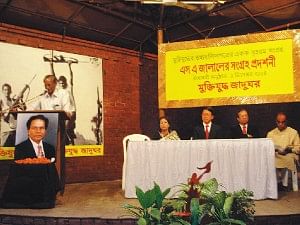Vignettes of a bygone era
Largest individual collection of Liberation War documents
Harun ur Rashid
The Liberation War Museum gets enriched with the largest collection of documents of the country's Liberation War. The collection contains correspondence, clippings from foreign newspapers, photographs, leaflets, letters and publications of the Mujibnagar Government collected by diplomat-freedom fighter Sheikh Ahmed Jalal.The exhibition is an important proof of the active participation of those who lived abroad during the war. Non-Resident Bangladeshis played an important role in constituting opinion and support in favour of Bangladesh during our Liberation War in 1971. They maintained an uninterrupted correspondence with the provisional Mujibnagar government of the newborn country. Besides, they wrote letters to foreign newspapers and magazines seeking support for the War of Independence of the Bangalees. Sheikh Ahmed Jalal was one of those who helped the Liberation War gain moral and economic assistance in Japan. After the country's independence, Jalal kept and preserved these documents with him for over 30 years. He intended to use all these documents in his writings on our Liberation War. He used a lot of these documents in his book Japan's Contribution in the Independence of Bangladesh. His untimely death in September 2003 left his wishes unfulfilled. However, his last wish has been fulfilled: he wanted to give all his collections to the Liberation War Museum. His wife Selima Jalal, handed over the collection to the museum on December 1 for public display. Japanese Ambassador to Bangladesh Matsushiru Horiguchi inaugurated the display after a brief discussion session. Member Secretary of the Liberation War Museum Dr Sarwar Ali, one of the trustees of the Museum WM Mofidul Haque, diplomat-freedom fighter Rajiul Hassan and Selima Jalal spoke on the occasion. When the Liberation War began, SA Jalal was in Japan having just finished his studies under the Japan Government's Monbusho scholarship. His ever enthusiastic spirit was reflected in his involvement with cultural activities in Japan. Along with his two friends he started the first school for learning Bangla for the Japanese. Despite the obstacles posed by the then Pakistan Government, they continued the certificate course quite successfully. Jalal enriched the library of the school to such an extent that the Pakistan consulate was compelled to recognise it. When the Liberation War began, it did not take Jalal long to determine his duty: he started campaigning against the war. It was due to Jalal's endeavour that many Japanese politicians and general people got involved in these activities. They supplied aid for the refugee camps. A Japanese General, who was also one of Netaji Subhash Bose's colleagues, provided the Mujibnagar Government with a detailed map of the Chittagong Port. Jalal's collection is enriched with documents of such activities. The collection contains the copy of the declaration of independence read on the oath-taking day of the Mujibnagar Government. It contains the Bangla and English versions of the first Constitution of Bangladesh. It also contains minutes of the National Advisors' Committee, consisting of personalities like Maulana Bhashani, comrade Moni Singh and Professor Mozaffar Ahmad. The latter document has not been published anywhere so far, not even in the 15-volume Muktijuddher Dolil. The collection bears proof of the role played by Japanese people and its government during the Liberation War. A large part of the collection comprises clippings from Japanese newspapers like Asahi Evening News, Mainichi Daily News and Japan Times. Besides, many foreign newspapers also mark Jalal's collection: among these are Sunday Times, Daily Mirror, Guardian, International Herald Tribune, China News, Manila Times and Korea Times. The total number of these newspaper cuttings stands at a colossal 3416. SA Jalal preserved all his documents in 32 volumes, each bound with a cover of green and red that reminds one of our National Flag. The display of these invaluable documents has been creatively designed by artist Ashok Karmakar. The display runs till December 16 from 10am to 5pm.
|

Dr Sarwar Ali speaks at the event; other guests are (sitting L-R) Selima Jalal, Japanese Ambassador Matsushiro Horiguchi, diplomat Rajiul Hassan and Mofidul Haque |